After years working in hospitality Monem decided to hop over the pass and turn his sights from Front of House to Back of House.
That being said, he wouldn’t call himself a chef and much prefers to the moniker ‘traditional cook.’ His cuisine is a homage to his Egyptian and British heritage, combining the beautifully rich tastes of Egypt with the best of British produce. The result is a contemporary take on Egyptian cuisine, rooted in recipes passed down through the generations that seeks to be as environmentally sustainable as possible. We sat down with Monem to learn more about the Brightonian-Cairene combination that is Cairovan.
How did it all begin?
It started back in 2016 when I was catering for my nephew’s wedding. It’s something that I’ve always done for family and everyone was telling me that I should think about doing it professionally. I was in the middle of working in London and my Mum wasn’t particularly well, so I thought it might be a good opportunity to be closer to her and try and set something up. When you set up a street food business you can kind of do it on a shoestring so it’s a great opportunity to give a go. We do Egyptian food because I’m half Egyptian, so all of our recipes and influences come from my grandmother, my father and my aunts. We use the best British local produce, which includes lamb from our family farm, and it sort of ties those two bits together; Egyptian food from my father’s side and the best British produce from my English side.
You have a family farm?! That’s amazing, could you talk to me a bit more about that.
It’s incredible! Basically I’m the second batch of children (which is the best batch to be) and before my Mum was married to my Dad she was married to a farmer and they had three children. He still has the farm and my siblings still live in the area. My nephew does all of our lamb for us on the farm. It’s mainly a nature reserve and campsite now, because obviously after farming for years in this country he’s had to diversify, but it’s nice because we have access to all this land and it’s great keeping it all within the family.
It sounds like a very family oriented business which is such a great testament to your heritage. Like you said you’ve got the recipes from one side and the produce from the other side.
Yeah and everyone else is forced to work on the van!
Do you see yourself staying as a mobile business or do you have goals for a bricks and mortar premises down the line?
When we originally started we were mainly looking into pop-ups and events, mainly events actually with festivals and weddings as the sort of thing we initially thought we would be doing. But now it’s all sorts! We do a lot of vineyards and breweries which are great and cuts out expensive pitch fees. We do a lot of weddings and they are fantastic. We’ve currently got a residency at Shelter Hall [in Brighton] for six months and that has been incredible. We’ve been there before and I think that’s kind of as much as I would want to have my own [fixed] establishment. I think a highlight for me of having a sort of seasonal business is that you make hay while the sun shines. We work very hard over summer and in the winter we sort of pack down and I can go see my family in Egypt or visit friends in Scotland and have a bit of time out which works really nicely.
I think that’s a great appeal of the industry isn’t it, that flexibility to pick when you want to work!
Yeah! In our first couple of years we tried so hard to work all the time and it just ended up being us in the van in thermal underwear and hats freezing at a market in the rain, which felt a bit pointless really. As our brand has kind of grown and we’ve worked with some great venues and places over the years, we’ve got a nice following which really helps us to be flexible. We start off in April and then go through till about October/November depending on what’s on. We do quite a lot with the National Trust as well, they tend to keep us busy in those two months so we’ll be there with our two orange vans in the carpark. It fits in with their colours and I think people like having options other than just a bland sandwich at a National Trust, this way they get to have a nice falafel or chicken shawarma which is much more exciting.
Definitely more exciting! That leads into my next question really nicely; we’re based in Birmingham and I’m being biased here but I think the cultural diversity here makes us Brummies quite adventurous with food. Have you found that people are becoming more adventurous with the dishes they are willing to try?
We did a wedding last week for a couple who obviously wanted to have our food, but a lot of their family weren’t quite as adventurous. When they were coming up to order they were a bit hesitant, but when we spoke to them about what it was and they tried different bits and pieces, I was actually quite surprised by how much they were willing to give it a go. Plus when they ate it they really enjoyed it! We’re based in Brighton and I think a lot of people in Brighton know what that style of food is; it’s kind of Greek-y, Turkish-y, there is a similar spice palate. But there are lots of people who don’t know, but are willing to try, so I think in recent years people are a lot more adventurous than they’ve ever been.
I think street food has definitely helped with that, a lot of people don’t have a local Egyptian restaurant for example, so when you turn up to an event they get the chance to try something new. You’re dedicated to sustainable practices and sourcing your food locally. I know that sourcing your lamb from your family farm is one major way in which you do this, but what are some other ways that you try to be environmentally conscious with your business?
Hodmedod’s supply all the pulses and grain that we use and they grow all of their stuff in the UK which is amazing. When I was starting out I did a lot of market research, which basically meant just eating all the time which was lovely, but I was really surprised by how many people were still using polystyrene and plastic [packaging]. It just didn’t sit comfortably with me because yes [environmentally friendly packaging] is more expensive, but it’s the right thing to do. With our packaging, we took a long time, not just looking for stuff that was recyclable but also fully compostable because we need to look after where we are. It all comes down to sustainability. When we don’t use our own lamb, if there is no lamb available for whatever reason, we use a lovely family butchers. We also use them for our chicken and that’s all outdoor bred in the UK. It’s also about being aware of what else you’re buying, which can be difficult. I would love to say we are completely plastic free with what we buy, but it’s not always possible. The lovely idea of having glass bottles isn’t very practical when you’re in a van and everything moves around all the time.
Sometimes it’s a case of progression not perfection. Multiple people making small but consistent steps to be more ecofriendly is arguably better than just one person doing it ‘perfectly.’ You might not be 100% plastic free but you are doing so many other things to be environmentally conscious. It’s also obviously better than doing nothing!
Yeah and that’s especially true with things like food waste! We’re in a really lucky situation where we basically have zero food waste. I think the only thing we ever potentially waste is our salad bits and even that we put in the compost on the farm which we then use for our herb garden. We try really hard to stay on top of food waste because it’s a massive problem at the moment isn’t it. There are so many people who don’t have access to food so you’ve got to be aware and careful of your actions. When we finish up in Brighton, whatever we have left over we wrap up and take to homeless people on the way home. Unfortunately there are a lot of homeless people in the area so it’s nice to be able to do something to help.
I think that’s something that, yet again, is so nice about this industry. You have the scope to have that mentality, whereas with larger chains we hear those awful stories of them throwing away unused food at the end of the day, rather than give it to people in need.
I remember when I worked for a large retailer years ago, all of the leftover food would be put in a locked bin because they didn’t want homeless people to have access and they wouldn’t give it away either. This was years ago but I was completely dumbfounded by how they thought that was an okay situation. More recently I was up in Edinburgh and there are these amazing charities that go around on a Friday collecting all the short dated food from supermarkets and local bakeries. They then set up for a three hour period for people to go and grab what they want from that.
You’re catering a wedding later today, this is a tough question, but do you have a favourite kind of event to cater?
Going to the breweries and the vineyards are really fun. It’s always a bit tricky because you never know what the weather is going to be like, but we work with some great guys who we’ve built a great relationship with and we get a few locals there. I think people are shocked by what good quality our food is which is always really nice so we get a lot of positive feedback which is lovely. We get positive feedback anyway, but those events are always really fun. A few weeks ago we were at a vineyard in the countryside and I’m not quite sure what happened but it was absolutely bonkers! Everyone was there like it was a mini festival with blankets and just chilling out, not in a rush for their food, just really enjoying what we had to offer.
What’s not to love about that! You have a select menu offering two main dishes which I really like because it’s that notion of ‘this is what we do and we do it well.’ Was that a conscious choice?
If you’re going to an event, let’s say a festival, and there are going to be loads of trucks, why would you dilute your menu because there are already so many different options available for people. Initially when we started it was just our falafel and lamb, they’re the stars of the show really and they’ve always worked well. During covid we took over our local village pub because it had shut and they said to us ‘why don’t you take it over and do what you can?’ That was amazing, all of our friends and family came and we were delivering around the village; it kept our business going. During that time we realised that people were up for a bit more and it was the first time that we had the available space to extend our menu slightly so then we started doing our chicken. Going on from that now we always try and have two to three wraps. We have always chicken, lamb or falafel and then a couple of other options. Personally, I know that when I go out for dinner I’d rather see a smaller menu because I know that it’s going to be cracking (hopefully) and I think people don’t mind it being small because they like what is on offer and it’s good quality.
Follow their journey here:
Cairovan – Contemporary Egyptian Street Food
Cairovan Egyptian Street Food (@cairo_van) • Instagram photos and videos
Keep an eye out for more stories from Issue 50 of the NCASS Member’s Magazine here.




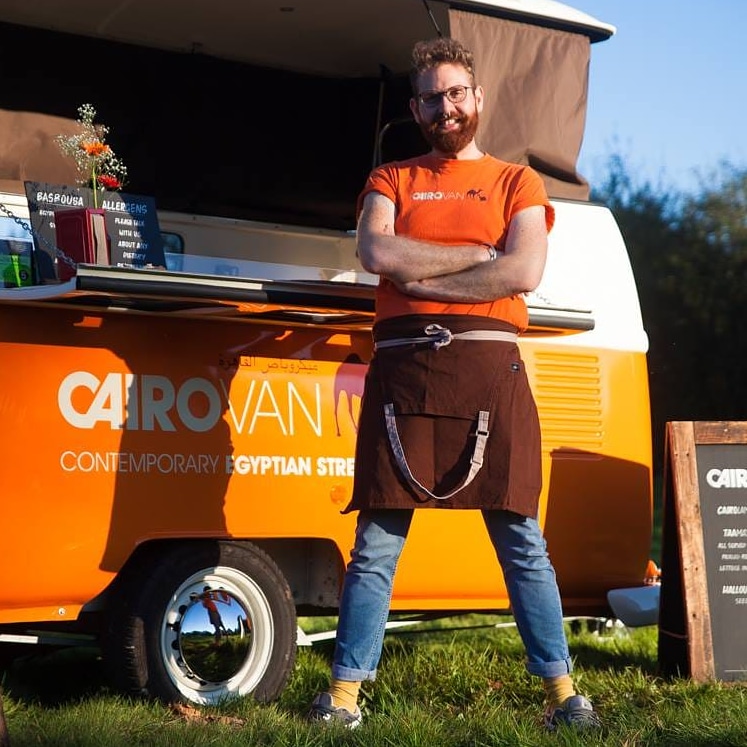
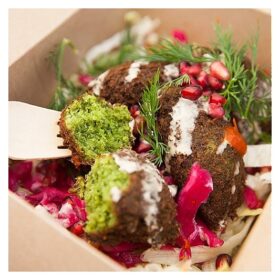
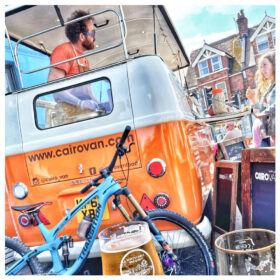
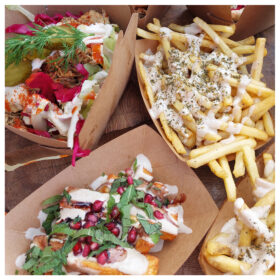
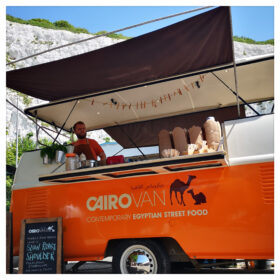
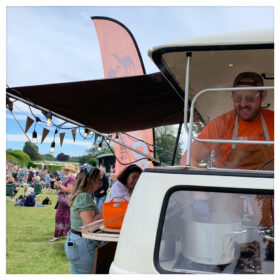
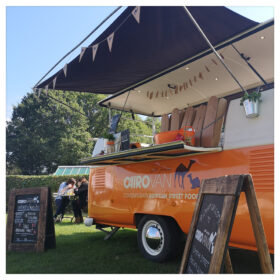
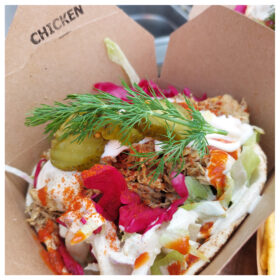
 Featured Training
Featured Training
OUR MEMBERSHIP
We're here to help make your catering business a success. Whether that be starting up or getting on top of your compliance and marketing. We're here to help you succeed.
Want our latest content?
Subscribe to our mailing list and get weekly insights, resources and articles for free
Get the emails